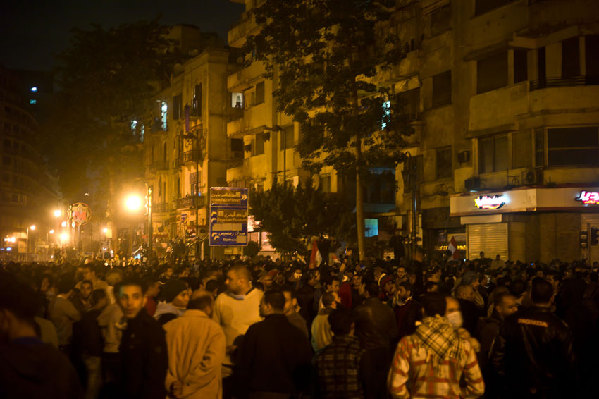Death toll rises to 35 as clashes continue in Egypt
 0 Comment(s)
0 Comment(s) Print
Print E-mail
Xinhua, November 24, 2011
E-mail
Xinhua, November 24, 2011
The death toll from the latest round of clashes which started over the weekend between protestors and the police across Egypt has risen to 35, the country's health ministry said Wednesday.
 |
|
People gather during a protest at Tahrir Square in Cairo, Egypt, Nov. 20, 2011.?[Xinhua] |
The deaths included 31 in the capital Cairo, two in the second largest city Alexandria, and one in Ismailia in northeastern Egypt and another in Matrouh in the northwest, the ministry said.
On Wednesday alone, 290 were injured, it added. A total of over 2,000 have by now been wounded since the outbreak of the fresh violent clashes in the country, as the mass protests entered its sixth day and has no sign of ebbing.
On Wednesday evening, the Tahrir Square in downtown Cairo, where the Interior Ministry building is and the epicenter of the turmoil earlier this year which toppled Egypt's ex-President Hosni Mubarak, was still brimmed with demonstrators estimated in tens of thousands, the same scenario as previous couple of days.
During the day, policemen fired tear gas canisters to the rock- throwing crowds of protestors in the Mohamed Mahmoud Street near the Tahrir Square, and three armored vehicles were seen deployed by the army on the street to curb clashes.
Troops and policemen arrested on Wednesday a group of 20 gunmen who attacked both the security forces and protestors near the Tahrir Square, official MENA news agency reported. Some weapons were seized, and officials said the arrests showed there were people who intended to create chaos.
Some youth groups, including the April 6 Movement and the Revolution Youth Coalition, insisted on continuing the protests. They demanded the departure of Field Marshal Hussein Tantawi, head of the current ruling military council.
But the military chief said in his televised address to the nation on Tuesday "the military does not expect to keep power" and that the military "is ready to hand over power immediately if people wish so" through a referendum.
In a move to placate protestors, the head of Egypt's ruling military council Hussein Tantawi said Tuesday that the council had accepted the cabinet's resignation and that presidential elections would take place by July 2012. He also vowed that the military council would hand over power back to a civilian government before July 1 that year.





